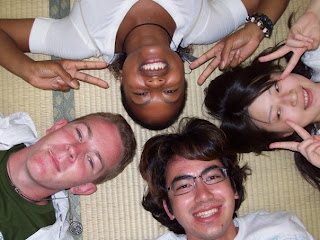
Today was an exhausting day. We had to go to a beach clean up at 9 am. The OIFA was already there, erecting canopies to shield participants from the sun. By 9:30 am, most of the participants arrived and the sun bared down on us as we were given large plastic bags to collect garbage. The green plastic bay was for burnable material, like cigarette butts, Styrofoam, and wood, while the brown plastic bags were for cans, bottles, plastic, and unburnable materials.
There was little trash to pick up, really. Most of the trash had to be dug out from between the stones of the rocky beach. While we worked, a 15 Channel one-man filming crew shot us collecting the waste and goofing around. Finally, a member of the OIFA called us back for us to start the presentation on our City.
The audience was given the presentation handout in Japanese, and after every slide, we waited for our counterparts to translate it. At the end, the four of us went to a brief interview with the 15 Channel guy. I was last to go.
“What was your first impression of Japan?” the camera guy asked.
“Well, I knew it had a lot of culture and traditions,” I replied, trying to formulate an answer. I smiled the entire time to show how approachable I was. “Fun, exciting, too.”
They asked me a few more questions, one OIFA member translating along the way. Once the interview was over, I joined Kelsey and Jason in life with food. Kelsey scarfed down a bowl of noodles, and as she ate with me watching, a newspaper reporter took pictures of us. We were asked to interact with the local participants in English, and a little 8-year-old siddled up to Jason and I alongside his obaasan (grandmother), anxiously gripping his shirt hem. I bent down to talk to him.
“What’s your name?”
He thought for a moment. “My name is Yuka.”
I repeated the name and asked a few questions. He became shy, so his grandmother thanked us and walked away. After some wait time, Jason and I grabbed a gyro-looking food. As I ate, an American OIFA member from South Dakota named Robert came up to me.
“Thank you for the handkerchief,” he said, showing the green clothe in one hand. Earlier, I had imparted the new 100-yen handkerchief to him. The material matched his striking emerald eyes.
We talked about Japanese food, how he became a teacher in Japan, and interacted with his Japanese friends whose English was good. Though 27, Robert looked like a high schooler, his small face showing many of his emotions.
I conversed with him before joining Miku and a family of three underneath a tent. Miku translated for me as the family asked me questions about America and the City. Their son, Yamato, shyly darted between his parents, whispering questions for me to answer. He returned my smiles with a toothy grin of his own, excitement written across his face.
Jason, Risa, and a few other guys started a game with a volleyball, setting and bumping the ball back and forth. Soon, we grew tired of the game and I returned to the family, enjoying the time with them before disappearing with Kelsey and the Odawara girls to the bathrooms. I changed my shirt into an extra A-shirt Jason stashed in his bag. We returned to begin the “watermelon cracking.”
The children stood in life, waiting be blindfolded, turned 10 times, and coaxed verbally to hit a watermelon with a large bamboo stick. Once the children went, it was our turn. I decided to go last because it was just like hitting a piñata, except you only got one try, which seemed like a wasted effort after all you did just to find the melon.
I found myself blindfolded, turned the 10 times, handed a bamboo stick, and carefully without swaying, walked cautiously towards the watermelon. I listened to Kelsey and Chris, and finally, I lifted the bamboo stick, thinking, “Well, nice try. It’s now or never.” I put as much effort into the swing as I could muster, and the sound of breaking rind and the watchers cheering filled my ears. They gathered up the shattered watermelon and quickly began cutting and distributing it. I was rewarded with the largest piece I had broken, and began eating.  The watermelon took me through the second watermelon cracking while Robert told me how precious the watermelon was to the people. His soft smile and dry humor made me laugh.
The watermelon took me through the second watermelon cracking while Robert told me how precious the watermelon was to the people. His soft smile and dry humor made me laugh.
Once the watermelon was done, we began gathering our things together, pulling down tents and helping the OIFA make the BBQ end officially.
Afterwards, we trekked off into the beach’s water, its cold feel providing us with relief from the humidity. The beach water hid the depth of the lowering canyon in the water. Eight feet after entering the water, and the land suddenly dropped, and you were left to waddle the rest of the way to the rope surrounding the swim zone. Surprisingly, we made the most out of the beach like it was still San Diego. At one point, a wave tossled Chris towards the edge of the water, and he rolled into me, knocking me over and sending me rolling behind him. The incident made me laugh before I realized my bra strap had separated and Eriko helped me readjust the strap to its former embarrassing glory.
We played in the water for half an hour, then made our way to the showers and bathrooms for changing. Together, the whole group walked for 20 minutes to the International Lounge and participated in an informal tea ceremony and origami. It left us less than an hour to explore the nearby store market where I purchased a pair of cute heels. We returned to the lounge to find everyone gathered for a practice in a dance called Cho-chonin for the Lantern Festival. Our teacher, an enthusiastic pro at heightening anyone’s spirits and flamboyant dancing, taught us the dance.
The practice ended and we streamed a block over to an ambiguously labeled building. There, we witnessed the official practice of the dance and went upstairs to change. Two little Japanese ladies folded the provided clothes into a traditional festival yukata, complete with a yellow bow in the back and the cloth of a hachimaki tucked into the right side of the yukata.
Once everyone was clad in the festival attire, we waddled down to the festival. Lanterns with different designs and booths filled with food, games, and gifts flanked a huge surround-sound stage. We took pictures with our lanterns lit before we were given a few minutes to locate some food. I chose a small dish of noodles, vegetables, and squid arms, and Eriko and I returned to the group in time for me to chow down on a chopstick of noodles.

Robert greeted us, and we were told that we would be heading out soon. “Will you be around for the festival?” I asked, fishing for some type of time frame. He thought for a moment before admitting he wouldn’t. “Aw, this might be the last time I see you.”
Robert smiled. “Well, I think I will see you at the Farewell Party,” he replied as he remembered. “All OIFA members have to go.”
My face lit up. “Really?”
“Yeah, and I might see you before then.” Before I had the chance to say anything, Eriko took me by the hand and began to drag me away. I threw Robert a sympathetic look, calling a quick “I have to go” before I was pulled across a bridge and into the streets where the festival dancing would take place. We lined up, joking and practicing the new dance moves, before we lined up and danced down the streets, each dance more coordinated to the booming voice of an avid instructor.
“Ichi, ni, san, close, open, ichi, ni, san, hey! Ichi, ni, san, hey! Right! Left! Ichi, ni, san yon, go, roku, nana, hachi, kuu! Juu! Ichi…”
We danced down the streets with the audience’s eyes on us for half an hour straight, until we were told to stop. Exhausted, we headed over the red bridge again, this time, to line up for the dance competition results. Kelsey fanned herself frantically as Jason tied his hachimaki around his head, sweat dripping down his reddened face. Risa, Eriko, Kelsey, Jason, Miku, and I went in search of shaved ice, which seemed to a very popular treat.
The strawberry-flavored ice went down cool and sweet, and I hurriedly devoured it as we trekked back to the obscure no-name building. I recovered my noodles and camera, and after scarfing down the food, joined everyone for a round of immense picture-taking. I laughed the entire time.
Everyone gathered their yukatas, which were becoming undone by people wanting to free themselves from the heat, and went upstairs to change. Kelsey immediately threw herself on the floor, fatigued from excitement and exercise. Another round of picture-taking proceeded—one with my foot in Kelsey’s face—before the entire group of yukata-clad women entered, and we changed back into our evening clothing.
In Japan, girls and women take pride in keeping up with fashion, even down to their bras and panties. Some of the bras and panties the girls wore looked very complicated but pretty in lacy and intricate design.
We finished dressing and we walked down the streets to the train station. Eriko and I headed home, both tired from dancing the excitement.











